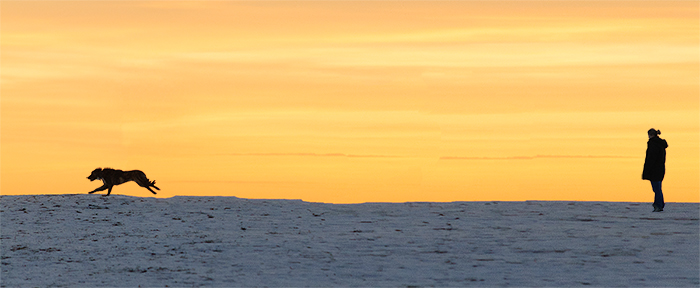
When the Retrievers take a new case, we always counsel owners not to expect that their dog will come when they call. Many find this perplexing. “But she loves me!” “Oh, he’ll come–I know he’ll come!”
I hope he does. Sometimes lost dogs will come when called. But often, they run from everyone, including their own owner. Why?
He’s Not in his Right Mind
So far, I know of no scientific research to confirm what a lost dog is thinking, but those of us deeply involved in lost dog searches have our own theories. Here’s mine:
A lost dog is out of his comfort zone. He has lost the security of familiar surroundings and a sense of control. Instead, he’s dealing with a barrage of new sights and scents and sounds. He’s overstimulated and anxious, unsure of what to do with all this new information.
It’s overwhelming and stressful, especially for dogs that are timid by nature.
A dog in this mental state is using what is informally known as the “lizard brain,” the parts of the brain governing the most primitive reactions of flight, flight, freeze, feed and other behaviors needed just to survive. In the parlance of lost dog searches, this is known as “survival mode.” When confronted with a threat, our mild-mannered domesticated companion animals will usually choose to flee.
Switching Off the Lizard Brain
What a lost dog needs most is security–knowing where to find shelter, food, water and safety. When these needs are met, the dog can begin to calm down and be driven less by his lizard brain and more by his normal thought processes.
We have heard accounts of lost dogs initially running from their owners, but when the owner behaved in a nonthreatening way (sitting or lying quietly, not calling out or making eye contact), the dog calmed down from a distance and stopped reacting reflexively. Lowering the stress level gave the dog a chance to use his “thinking” part of the brain, to remember the owner’s scent, appearance and sound of his voice. Owners describe it as if “a light bulb went off,” and suddenly the dog was in their lap.
Gimme Shelter
Lost dogs in survival mode often stay on the move. The first step in switching off his lizard brain is to slow him down by providing food, water and shelter in a quiet place where he can feel safe. Even if he never feels secure enough to come to his owner or anyone else, he’ll be habituated to a specific location where he can be caught in a humane trap.
©2015 The Retrievers Inc. May be freely shared with attribution to theretrievers.org.
Photo ©2012 Devon Thomas Treadwell. All rights reserved.
Recent Comments